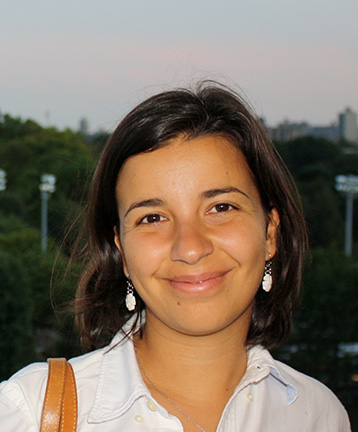
Maria Antonietta Vincenti
In this installment of Senior Member Insights, we talk with Maria Antonietta Vincenti. Maria Antonietta is an assistant professor and Rita Levi-Montalcini Fellow for the Department of Information Engineering at Università degli Studi di Brescia, Italy. Prior to joining Università degli Studi di Brescia, she worked as a research fellow at the U.S. Army Charles M. Bowden Laboratory at Redstone Arsenal, USA, as a research scientist for AEgis Technologies Inc., USA, and as a research associate of the National Research Council at the U.S. Army Aviation and Missile Research Development and Engineering Center, USA.
Maria Antonietta is also a topical editor for Chinese Optics Letters, serves as a reviewer for international research projects funded by the U.S. Department of Defense and also as a referee for numerous international journals, including the OSA journals Optics Letters, Optics Express, Journal of Optical Society of America B and Applied Optics.
Her research activity focuses on theoretical investigations and computational modeling of linear and nonlinear interactions in optical nanostructures, including plasmonic devices, optical sensors, low-permittivity media, 2-D materials like graphene, and subwavelength structures for light harvesting.
What first interested you in pursuing science?
Since I was a kid, I have always loved to study. I was probably the only kid in class who was sad at the end of the school year. Pursuing a career in science and research came really naturally to me, since it never felt like a job but like a continuation of what I always loved: learning new things every day.
What aspect of your current work do you find the most interesting or exciting?
After my Ph.D. and my postdoc, which were completely focused on research, I got a tenure-track role at the University of Brescia in Italy. I feel that the teaching part of the job somehow gives me an opportunity to give back all of the things that I have learned, and pushes me to learn more. I also find that going back to books that I haven’t looked at in a while gives me a completely different perspective now that I have more experience.
What advice do you have for young scientists who are discouraged about their current work or career path?
Look for a mentor that has a positive attitude and that is passionate about their job. Passion for science is contagious and will give you the courage to push through the lows and share your happiness when you accomplish your goals. If your job environment is not stimulating and does not make you feel happy, just change it!
What professional resources do you rely on to stay active and engaged with your field?
I try to participate in conferences as much as possible, but I enjoy a lot of small workshops and events, which are more restricted in size and allow for building new, fruitful collaborations.
What tips for successful networking do you have for early-career professionals?
Don’t be shy about your ideas. Ask questions and engage with other scientists as much as you can. You will always learn new things and find new inspirations.
What have you learned by being a mentor to others, and what have you learned from mentors who helped shepherd your career?
I have mostly worked in research centers and industry and joined academia quite recently, so I have been a mentor for only a few students during my career.
I try to follow the example I got from my mentor: I try to be respectful of others’ ideas and let them follow what they find most inspiring. Although most of the time we need to follow precise tasks and get to specific objectives when imposed by projects, I was always free to wonder and research on the topics I liked the most. I think this is the best thing a mentor can do for you: let you feel free to pursue what you like.
What are daily habits that help you to be successful?
Definitely my “to do list” is essential to get through the day! Also choosing the right priorities within the tasks helps to make the most out of your time.
How important are leadership roles in career development and how do you hone your leadership skills?
I consider myself really lucky for all of the people I have encountered on my career path. I never really felt like someone was “supervising” my job, but rather that they were advising and sharing with me what I was trying to accomplish. I try to follow this kind of approach as much as possible and try to tailor my requests depending on the type of person I deal with.
Some people work really well under pressure, but some others really do not. I think understanding this aspect in a student or collaborator is essential for a fruitful and happy work relationship.
At this point in your career, what are you most looking forward to next?
My first “short-term” goal is to get the tenure! After that, I look forward to building a nicely sized research group.
If you weren’t in the sciences, what would be your dream career?
I would definitely be a medical doctor!
